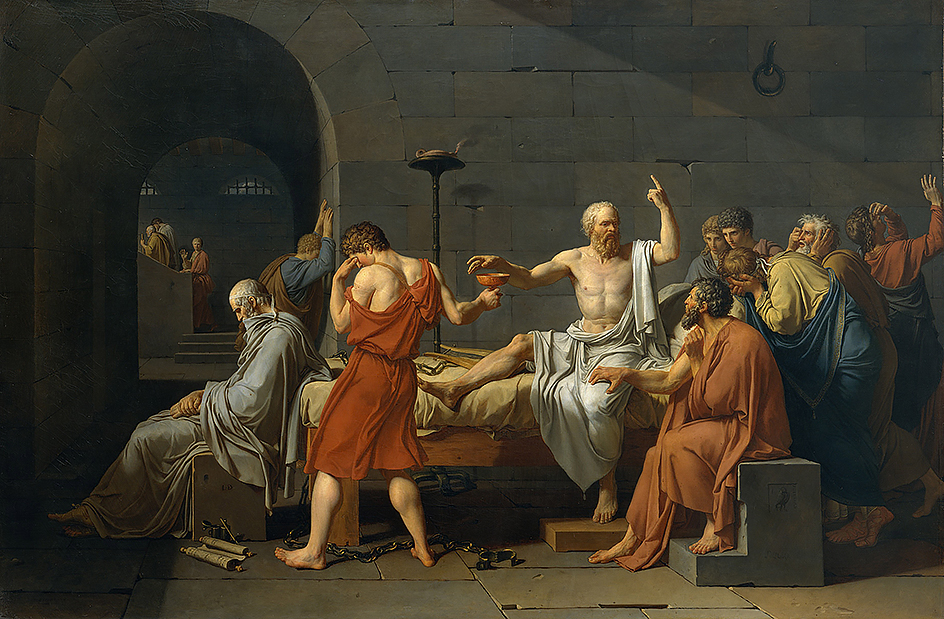Socrates << SAHK ruh `teez` >> (about 470-399 B.C.) was a Greek philosopher and teacher. Socrates was one of the most original, influential, and controversial figures in ancient Greek philosophy and in the history of Western thought.

Before Socrates, Greek philosophy focused on the nature and origin of the universe. He redirected philosophy toward a consideration of moral problems and how people should best live their lives. Socrates urged his fellow Greeks to consider as the most important things in life the moral character of their souls and the search for knowledge of moral ideas like justice. He was credited with saying “the unexamined life is not worth living.” Socrates’s teachings, combined with his noble life and calm acceptance of death, have made him the model of what it is to be a philosopher.
The Socratic problem.
Because Socrates wrote nothing, our only knowledge of his ideas comes from other Greek writers. The most important sources are the dialogues written by one of his followers, Plato. Also important are the writings of the historian Xenophon; the comedy Clouds, by the playwright Aristophanes; and writings of Plato’s pupil Aristotle. The difficulty of determining the character and beliefs of Socrates based on these sources is referred to as “the Socratic problem.” The most common understanding of Socrates comes from Plato’s dialogues, which communicate the force of Socrates’s intellect and character. Plato’s Apology of Socrates is regarded as a reliable representation of Socrates’s defense of his life at his trial. His Euthyphro and Laches are probably true to the spirit of Socrates’s philosophical method. See Plato (Plato’s writings) .
Socrates’s life.
Socrates was born near Athens, and spent most of his life in Athens. His wife, Xanthippe, was supposedly ill-tempered. They had three sons. Socrates spent most of his time in conversations with a wide range of Athenians, but mostly with young men. Plato distinguished Socrates from the professional teachers of the day, who were called Sophists. Plato emphasized that Socrates did not accept money from his listeners. As a result, Socrates was very poor. Socrates was famous for his self-control and also for his indifference to physical comfort. Supposedly, he once stood in one spot for a day and night puzzling over a philosophical problem.
Many Athenians were annoyed by Socrates’s constant examination of their moral assumptions. Plato showed Socrates engaging leading Athenian citizens in conversation. They entered the conversations believing that they knew the nature of such virtues as piety or courage. But Socrates soon showed them that their beliefs were contradictory or confused. He also criticized some assumptions of the Athenian democratic system. Hostility arose in Athens toward Socrates. At the age of 70, Socrates was brought to trial and charged with “not believing in the gods the state believes in, and introducing different new divine powers; and also for corrupting the young.” Socrates was convicted and sentenced to death. He could have escaped from prison, but he felt morally obligated to follow the court’s decision, even if it was unjust. His arguments for his action are recorded in Plato’s Crito. Plato’s Phaedo describes Socrates’s calm in the face of death and his drinking of the poison, hemlock, which the Athenians used for the death penalty.
Although Socrates’s conviction was unjust, there was some truth to the charges against him. Socrates apparently observed the religious rites of Athens and believed in divine power. But Plato’s Euthyphro indicates that Socrates would not accept stories that showed the gods acting immorally. Socrates also claimed to have received a “divine sign” that kept him from committing immoral actions. Also, his repeated demonstration of the weak reasoning behind most people’s moral beliefs could be seen as teaching the young to reject the morals accepted by society. In fact, Socrates’s ultimate goal was to encourage people to devote their lives to considering how to live morally.
The Socratic method.
As a philosopher, Socrates is more important for his philosophical methods than for any specific doctrine. The dialogue form was probably invented by Plato to portray the Socratic method or dialectic. The method consisted of asking questions like “What is courage?” of people who were confident of the answer. Socrates, claiming ignorance of the answers to the questions, would gradually show the people’s beliefs to be contradictory. Socrates did not answer his questions, though much could be learned from the course of the discussion.
Socrates was the first philosopher to make a clear distinction between body and soul and to place higher value on the soul. His examination of such moral ideas as piety and courage represent an important first attempt to arrive at universal definitions of terms. He believed that a person must have a knowledge of moral ideas to act morally.
